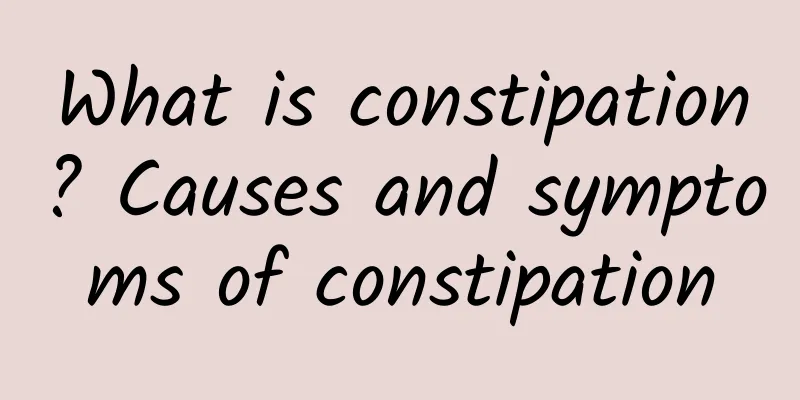What is constipation? Causes and symptoms of constipation

|
What exactly is constipation? I believe many people don't know what constipation really refers to. They only know that constipation is difficulty in defecation. In fact, constipation is a general term for a class of diseases, and different patients have different symptoms. Next, the editor will reveal the answer to you. What is constipation Constipation refers to the condition where the stool stays in the intestines for too long, resulting in less frequent bowel movements, dry stools, difficulty in passing stools, or incomplete bowel movements. Generally, no bowel movements for more than two days may indicate the presence of constipation. If you have bowel movements every day, but have difficulty in defecation and still feel like there is stool residue after defecation, or if you have abdominal distension, this should also be considered constipation. Many constipation patients defecate 1-3 times per week, and in severe cases, they defecate only once every 2-4 weeks. Some people defecate multiple times a day, but it is difficult to defecate, and each defecation time can be more than 30 minutes. The feces are as hard as sheep feces and the amount is very small. Symptoms of constipation The symptoms of constipation can be roughly divided into two categories: 1. Symptoms of functional constipation: This is constipation caused by the weakening of the function of the large intestine or rectum, or by always holding back the urge to defecate. It is generally painless, but the urge to defecate is weak, the interval between bowel movements is about 3 days, and it is difficult to defecate. It is also often accompanied by systemic symptoms such as abdominal distension, loss of appetite, dizziness, fatigue, palpitations, thick and greasy tongue coating, etc. 2. Symptoms of organic constipation: This is caused by a disease that causes the intestines to become narrow, or foreign bodies in the large intestine, making it difficult for stool to pass through the intestines. For example, constipation caused by tumors often changes the shape of stool and is often accompanied by purulent blood and mucus. Sudden constipation, abdominal pain, nausea, vomiting, intestinal obstruction and intussusception should be considered. If it is after abdominal surgery, intestinal adhesions should be considered. |
>>: Is a man’s sudden lower abdominal pain related to certain diseases?
Recommend
What can men eat to grow taller?
Height has always been a factor that many people ...
How to clean the glans penis with potassium permanganate
Potassium permanganate is a chemical solution tha...
How can men lose weight on their legs?
Not only women want to have slender legs, men als...
What causes testicular retraction?
Men have two testicles located in the scrotum. Th...
What are the methods for men to strengthen their kidneys and enhance their sexual performance?
I believe everyone is familiar with the term &quo...
How to shrink pores for boys
Over the years, stress in life, and irregular wor...
The reason why boys have dark spots on their faces
In daily life, we can see that many men have blac...
How long does it take to build abdominal muscles?
Perhaps many male friends hope to have abdominal ...
What is the effect of orchitis treatment?
In this issue, I want to talk about a very privat...
What are the effects and functions of folic acid tablets for men?
When it comes to folic acid, everyone will think ...
What should men eat to treat sexual dysfunction?
I believe that many men, as the head of the famil...
10 Foods Men Should Eat and Drink
Ladies, you all know that your man is actually a ...
The consequences of masturbation are like this, don’t take it lightly!
As we all know, men usually develop the habit of ...
Can men's venous vasospasm be treated with medication?
Have you heard of vasospasm? I believe that most ...
Disadvantages of eyebrow trimming for boys
In fact, many women have realized the important r...









